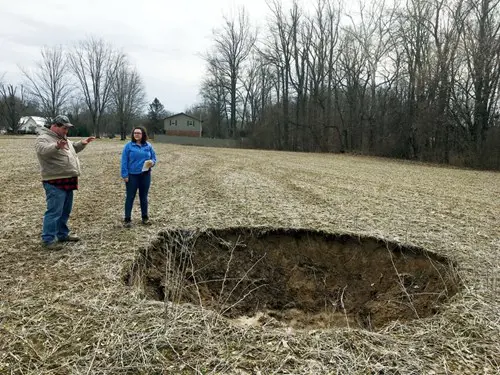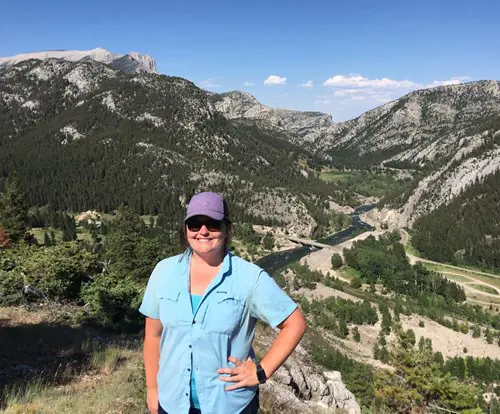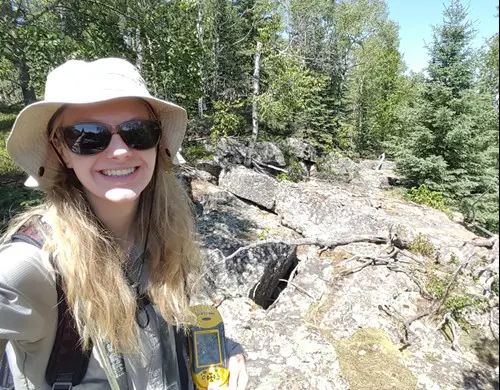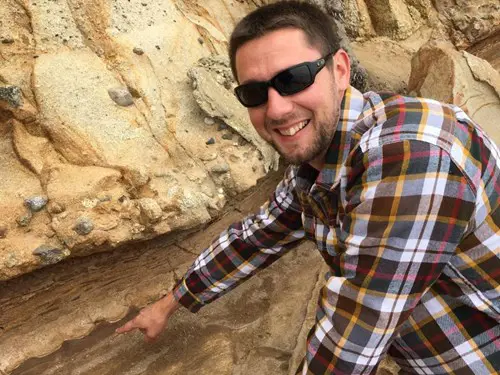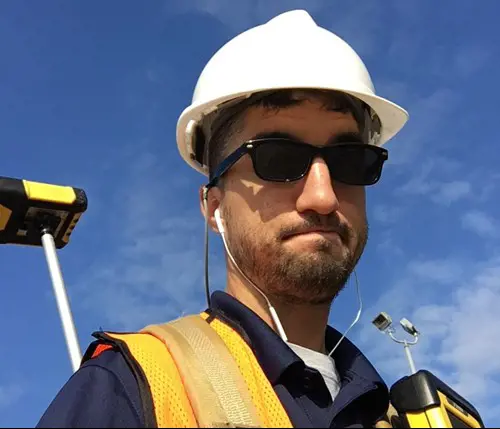At the University of Southern Indiana (USI), our graduates are extremely successful in securing jobs. Over the past five years, 96 percent of our Environmental Science and Geology graduates (n=46) are gainfully employed and pursuing meaningful careers. In addition, 100 percent of our graduates in the past five years (n=8) pursing an advanced degree (Master’s Degree) have received tuition waivers and a living wage. Essentially, this means that these students are able to earn a Master’s degree without incurring any debt, while earning a wage by either teaching lab sections, or receiving a salary as a paid researcher. The following are testimonials from several of our recent graduates.
Hannah Walker ('18, Environmental Science) in the field during a site investigation. She is speaking with a landowner about the hole in his field. This work is associated with the Abandoned Mine Lands Program, and the goal will be to eliminate the safety hazard of this depression and restore the land for crop use.
"USI's Environmental Science program prepared me for my job as an Environmental Specialist for Indiana's Department of Natural Resources. The interplay between natural science, society, and environmental history in this program provided me with a balanced view to pursue a successful career as an environmental scientist. Courses such as Introduction to Geographic Information Systems and Advanced Environmental Geology taught me how to use technology and to communicate effectively with fellow scientists and the general public. These experiences provided me with the confidence to find my place in the Environmental Science field." -- Hannah Walker, '18, Environmental Science, USI
Grace Stone graduated with a B.S. degree in Geology from USI in Spring 2017. Photograph of Grace Stone in Sun River Canyon, Montana.
"I am currently working on my Master's degree in Geology at the University of Louisiana at Lafayette (UL). In addition to working on my master's thesis, Geochemical Analysis of the Tuscaloosa Marine Shale (Upper Cretaceous) Core Recovered from Eads Poitevent # 1, I am also a Teaching Assistant at University of Louisiana at Lafayette. After graduating with my Master's degree, I hope to work in the energy industry. I will be presenting my findings at the American Association of Petroleum Geologists (AAPG) Student Expo, AAPG Rocky Mountain Rendezvous, and at the annual meeting of the Geological Society of America. Next semester I will compete with my team at AAPG's Imperial Barrel Award (IBA) competition. It is very high stakes, being that UL won the world championship last year." -- Grace Stone, '17, Geology, USI
Rachel Bacher graduated with a B.S. degree in Environmental Science from USI in Fall 2017. She is pictured here in the Black Hills of South Dakota.
"I’m a biological science technician for the U.S. Forest Service. In the summer, I conduct wildlife surveys for sensitive species, such as Northern Goshawks, Golden Eagles, Horned Lizards, Pine Marten, etc. I help protect foraging habitat, nests, and other critical areas in the forest for these species. Starting in the winter, I will begin entering data into our national database for the raptors on our forest (the Black Hills National Forest), which will be used in a future study." -- Rachel Bacher, '17, Environmental Science
Michael Stephens graduated with a B.S. degree in Geology in Spring 2015 from USI. In this photograph, Michael is pointing out cross-bedding in a sandstone exposed along the California coast.
"After finishing a master's degree in geology from California State University at Sacramento in 2017, I started working for the U.S. Geological Survey as a Hydrologist in the California Water Science Center. I work for the California Oil, Gas, and Groundwater program, where our central goal is to answer questions about the impacts of oil and gas development on water resources in the state. Specifically, I use geophysical and geochemical data to map groundwater salinity in and around oil fields to identify protected groundwater resources." -- Michael Stephens, '15, Geology
Bryce Chambers graduated with a B.S. degree in Earth-Space Science Secondary Teaching in Spring 2011 and a B.S. degree in Geology from in Spring 2013 from USI.
"I am a Project Manager at Farmer Environmental Group (an environmental consulting company) in Houston Texas. I work on a wide range of projects from asbestos inspections, Phase I and II Environmental Site Assessments, and my specialty Naturally Occurring Radioactive Materials (NORM) Surveying and remediation. I spend the bulk of my time traveling the country and mapping radiation levels at storage yards for used oilfield pipe. I have been a GIT (Geologist In Training) for the past 5 years and just recently sat for the PG (Professional Geologist) exam. I'm still awaiting results for the test but hope i can call myself a PG by the end of the year." -- Bryce Chambers, '11, Secondary Science Teaching; '13, Geology
Environmental Scientists are concerned with the interaction of the human population with natural systems, such as water, soils, and living organisms. This includes the detailed study of ecosystems, impacts of air and water pollution, diversity of plant and animal life, impacts of invasive species, and balancing public policy with responsible environmental stewardship.
A Geologist is a scientist interested in the comprehensive study of the Earth. This includes the detailed study of earthquakes, volcanoes, rivers, lakes, glaciers, deserts, and the oceans to name a few. Geologists combine their understanding of earth materials (minerals and rocks) with processes to discover natural resources and solve real-world problems.
Geologists and environmental scientists have a natural curiosity about the Earth. What impact will melting glaciers have on the oceans and climate? What are natural hazards and how can they be averted? What will be the impact on society of depleted resources, such as fresh water?
Geologists and environmental scientists are concerned about the Earth. How and where will we dispose of industrial and nuclear wastes, such as what remediation can be done to clean up polluted areas? How can we meet society's growing demands for energy and conserve natural resources for future generations?
In summary, geologists and environmental scientists enjoy the outdoors, understand risks and causes of natural disasters, comprehend temporal and/or spatial relationships, and are responsible stewards of the Earth. At USI, the geology and environmental science programs focuses on hands-on learning, including field trips that build a student's passion for knowledge and application of this knowledge too solving real-world problems.
Environmental scientists may be found working in national parks or forests, in abandoned mine sites, and in densely populated urban areas. While some may gather data and monitor conditions in the field, this is more likely to be done by a geotechnical specialist. Those who do work in the field may find it demanding, and work in all kinds of weather. Environmental scientists often divide their time among the field, the laboratory, and the office.
Geologists may be found sampling the deep ocean floor or collecting rock specimens on the Moon. But the work of most geoscientists is more "down to earth." They work as explorers for new mineral or hydrocarbon resources, consultants on engineering or environmental problems, researchers, teachers, writers, editors, museum curators and in many other challenging occupations. They often divide their time among the joys of working in the outdoor environment, the laboratory and the office.
Field work may entail the preparation of geologic maps and collecting samples that will later be analyzed in the laboratory. Geoscientists may also conduct experiments or design computer models to test hypotheses in order to provide data which will mitigate the effects of earthquakes, volcanic eruptions and flooding.
In the office, geologists and environmental scientists integrate field and laboratory data to write reports that include maps and diagrams that illustrate the results of their investigations. Such maps can pinpoint areas favorable to the occurrence of ores, coal, oil, natural gas or underground water, or indicate subsurface conditions of construction sites.
High school students planning to major in environmental science or geology need to complete two years of algebra, one year of geometry/trigonometry, and one year of chemistry. They are also encouraged to complete courses in Pre-Calculus and Calculus. The ability of students to express ideas and concepts clearly and concisely, both orally and in written form, is fundamental to all sciences, and especially environmental science and geology.
Transfer students electing to major in environmental science or geology at USI need to contact a faculty member as soon as possible. Early completion of the chemistry sequence is especially important for beginning environmental science or geology majors.
By pursing a degree in environmental science or geology, you will learn to examine imperfect data sets, a mixture of descriptive and numerical data, open-ended problems with several possible solutions, and the necessity of picking the best explanation given limited data. This ability to logically confront open-ended and messy problems is directly analogous to making decisions in business, government, public policy, and other real-world situations because, in fact, life is messy.
Compared with non-science majors, environmental science and geology majors have extensive experience with various software programs, are comfortable with numerical calculations, are familiar with technical issues, and are experienced at integrating and balancing a complex set of objective data (including both numerical and qualitative observations) when addressing a problem. If you made an effort to take classes that developed your writing and oral presentation skills, then be sure to tout these talents as well. Employers seek out people with technical skills who can also communicate effectively.
Geoscientists (geologists and environmental scientists) are employed in a wide range of academic, industrial, and governmental positions. Salary varies greatly, but is generally more than $35,000 a year for entering geoscientists. Some petroleum geologists have a beginning salary of $75,000 per year. Starting salaries increase significantly with completion of a Master’s degree in geology, with environmental consulting positions starting at $45,000 and petroleum geologists starting at $102,900 per year (AAPG 2015 Salary Survey). In most cases, high performing geology students will be able to complete a M.S. degree at no additional cost via tuition waiver, along with a stipend for conducting research or teaching at the University. The following table summarizes salaries for selected Earth and Space Science occupations, and the average salary for physical scientists and for all occupations.
Geoscientists (geologists and environmental scientists) are employed in a wide range of academic, industrial, and governmental positions. Salary varies greatly, but is generally more than $35,000 a year for entering geoscientists. Some petroleum geologists have a beginning salary of $75,000 per year. Starting salaries increase significantly with completion of a Master’s degree in geology, with environmental consulting positions starting at $45,000 and petroleum geologists starting at $102,900 per year (AAPG 2015 Salary Survey). In most cases, high performing geology students will be able to complete a M.S. degree at no additional cost via tuition waiver, along with a stipend for conducting research or teaching at the University. The following table summarizes salaries for selected Earth and Space Science occupations, and the average salary for physical scientists and for all occupations.
Environmental geology is a broad field that includes such things as site assessment, site remediation, groundwater geology, surface water hydrology, and ensuring that various organizations comply with the relevant environmental regulations. You could work for a government agency, for a company wanting to ensure its own compliance with environmental regulations, or for a private environmental consulting company. Many private companies hire at the bachelor’s and master’s levels, with pay corresponding to your level of training and experience. There is a large number of firms with a correspondingly large range in size and personality.
Geotechnical geology and engineering geology is concerned with the stability of soil and rocks in a host of civil engineering, mining, and petroleum situations. Lower level work often involves soil sampling and assessment of new construction sites. Higher level work involves the application of rock mechanics and various engineering principles to the construction of road cuts, bridges, dams, locks, dikes, and major buildings. Higher level work, and higher paid positions, will certainly require at least a master's degree in engineering geology.
The major oil companies (e.g., BP. ExxonMobil, Shell, etc.) tend to hire only geologists with masters or PhD degrees. Smaller oil and natural gas companies are more likely to hire students with bachelor’s degrees, especially during a boom cycle. The best way to get a petroleum job is to go to a graduate school that attracts lots of oil companies on their annual recruitment tours. Ask the schools you are considering about their ties to oil companies.
While getting master's degree in a petroleum-focused subject (like seismic stratigraphy) seems to make sense, in fact many oil companies are less interested in your specific research skills and more interested in hiring the most intelligent people available. Also, the ability to productively work in a team is a must. So, do your thesis research on whatever you find interesting! A second way to get an oil company job is to scan the want ads of the major Houston, Texas, newspapers (most oil companies have their exploration divisions in Houston and advertise open positions in the newspapers). Corporate web pages may or may not solicit resumes.
One advantage of working in the petroleum industry is the high salaries and great benefits. The main disadvantage is that the oil industry has historically gone through boom (hiring) and bust (layoff) periods. Fortunately, the oil industry currently needs to replace baby boomers, so the major companies are pursuing a strategy of slow but sustained hiring in an effort to transfer the vast experience of the baby boomers to the next generation of geologists.
Most mining jobs require at least a master's degree in economic geology, so choose an appropriate graduate program and ask lots of questions before embarking on this career. Although many economic jobs require you to live overseas, there are mining and quarrying operations all over the country, and persistent investigation and informational interviewing could easily turn up a job.
These jobs include basic field research for purposes ranging from the assessment of contaminated waste sites to the viability of future waste sites to the stability of road cuts and bridge pilings. They also include library and field research aimed at developing policy papers or undertaking basic outreach and public education. You could end up working for various environmental organizations, natural science museums, the Environmental Protection Agency, the National Park Service, regional and city planning agencies, and other such agencies that need geological expertise. Government jobs also include the United States Geological Survey, which has divisions that cover basic geology, water resources, and volcanic and earthquake hazards.
A geology degree provides a broad scientific background for those wishing to teach science in a primary or secondary school. You should consult with the Department of Teacher Education for more information regarding the requirements for teaching various Earth science-related courses in public or private schools.
To become a professor you will have to get a PhD. Be aware that the academic career track is highly competitive. Getting into a good PhD program is relatively easy, getting a postdoctoral position is somewhat challenging, getting a tenure-track position is quite challenging, and earning tenure is sometimes even more challenging. Be prepared for stress the whole way. While it is most difficult to obtain and keep a position at a major research university, even four-year liberal arts colleges generally expect enough research and grant money to make tenure a challenge. In general, the pursuit of an academic career requires enough love of research and teaching that you do not mind the years of hard work and stress.
